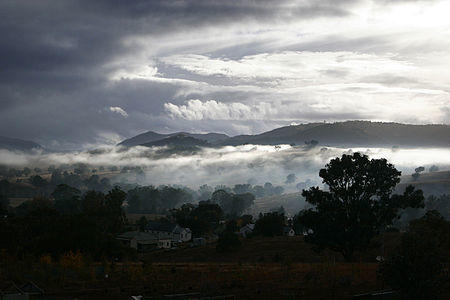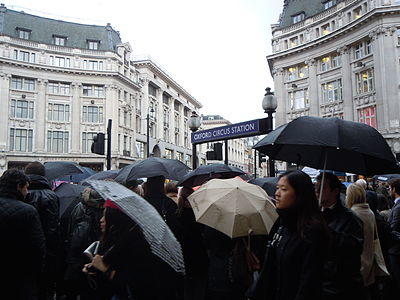Morning is the period of time from sunrise to noon. There are no exact times for when morning begins (also true for evening and night) because it can vary according to one's lifestyle and the hours of daylight at each time of year.[1] However, morning strictly ends at noon, which is when afternoon starts. Morning can be defined as starting from midnight to noon.
Morning precedes afternoon, evening, and night in the sequence of a day. Originally, the term referred to sunrise.[2]
Etymology
The Modern English words "morning" and "tomorrow" began in Middle English as morwening, developing into morwen, then morwe, and eventually morrow. English, unlike some other languages, has separate terms for "morning" and "tomorrow", despite their common root. Other languages, like German, may use a single word – Morgen – to signify both "morning" and "tomorrow".[3][4]
Significance
Greeting
Some languages that use the time of day in greeting have a special greeting for morning, such as the English good morning. The appropriate time to use such greetings, such as whether it may be used between midnight and dawn, depends on the culture's or speaker's concept of morning.[5] The use of 'good morning' is ambiguous, usually depending on when the person woke up. As a general rule, the greeting is normally used from 3:00a.m. to around noon.
Many people greet someone with the shortened 'morning' rather than 'good morning'. It is used as a greeting, never a farewell, unlike 'good night' which is used as the latter. To show respect, one can add the addressee's last name after the salutation: Good morning, Mr. Smith.
Activities
Morning typically encompasses activities such as bathing, eating breakfast and possibly elevenses, getting dressed, and, for some people, planning the day's schedule or reading a morning newspaper.
Cultural use
For some, the word morning may refer to the period immediately following waking up, irrespective of the current time of day. This modern sense of morning is due largely to the worldwide spread of electricity, and the independence from natural light sources.[6]
Genealogy
The morning period may be a period of enhanced or reduced energy and productivity. The ability of a person to wake up effectively in the morning may be influenced by a gene called "Period 3". This gene comes in two forms, a "long" and a "short" variant. It seems to affect the person's preference for mornings or evenings. People who carry the long variant were over-represented as morning people, while the ones carrying the short variant were evening preference people.[7]
Liturgy of the Hours
In the morning period are also included specific phases of the Liturgy of the Hours.
Gallery
Yosemite Valley in the morning
Maple tree with red leaves in the morning mist. Western Estonia
References
- ^ Learner's Dictionary
- ^ Online Etymology Dictionary
- ^ Origin of the phrase "Good Morning Archived 2012-02-03 at the Wayback Machine
- ^ Etymology of the word "morning
- ^ "Definition of good morning | Dictionary.com". www.dictionary.com. Retrieved 2019-12-31.
- ^ "Why some of us are early risers". BBC News. London. 2003-06-17. Retrieved 2008-01-30.
- ^ Gene determines sleep patterns





